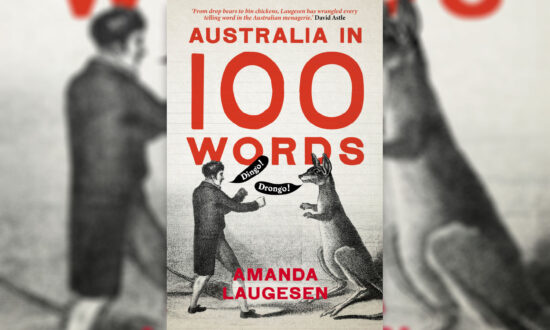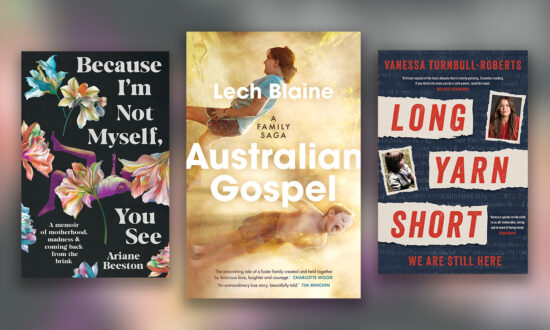“A Eurocentric view positions time as linear but as Indigenous peoples we are raised to understand time as circular,” writes Amy Thunig, in the opening pages of her extraordinary memoir, Tell Me Again (UQP, November).
This idea is reflected in the book’s structure: a sequence of self-contained chapters, each leading to the next, and echoing the themes of the whole.
Thunig was raised in a family “ancient and filled with love, even amidst brokenness”. Her parents were caught in a cycle of heroin addiction throughout her childhood and adolescence; her earliest memory, aged two, is of being in a car with her father and sister, singing together on the way back from the shops, when the car is swarmed by men with guns and her father is arrested. He spends the next six years in jail, for armed robbery. Amy believes what she is told: that her father is away at “work”.
 Each chapter is circular, moving through time. Typically, a chapter begins with a scene from the present, or recent past, then plunges into childhood or adolescence, sometimes ending back where it began. Thunig writes that she moves through life in layers of time, always aware of “past-me” and “future-me”.
Each chapter is circular, moving through time. Typically, a chapter begins with a scene from the present, or recent past, then plunges into childhood or adolescence, sometimes ending back where it began. Thunig writes that she moves through life in layers of time, always aware of “past-me” and “future-me”.
So, in one chapter, she opens at a daughter’s ballet concert, working on her laptop (she can’t afford time off) and drinking white wine she hates, “to fit in”. She cries, moved by pride for her child and the beauty of the production – but also grief for the ballet classes she desperately wanted and could never have when she was a child. “The complexities of parenting and dreaming in the present, while processing my own trauma and past, are hard sometimes,” she reflects.
This complexity – of trauma and overcoming it, of present (relative) privilege and past disadvantage, of grief and joy, of love and resentment – characterises this memoir throughout. And Thunig masterfully combines these elements to tell her story.
Most impressive and affecting is the way she writes family, and her parents – whose chaos and intermittent neglect is balanced with shared stories, authentic affection, and tender familiarity. Throughout her childhood, they tell and retell the story of when she was born: a nurturing, idealised origin story. It’s not until she’s pregnant with her own daughter that they reveal the sadder, more complex truth. But that sanitised story was an act of love.
“The same people who in clear ways failed me – who struggled with their addiction only to repeatedly succumb – also built me up and taught me the lessons and qualities that have led to my success. I am of them.”
The system and our institutions are very much complicit in Thunig’s trauma. When her mother (wisely) checks herself into a hospital for mental respite, while grieving a lost baby (during the period her husband is in jail), young Amy is nearly taken by welfare officers – despite the hospital being told her beloved grandfather is coming to collect her. When Year 10 Amy reluctantly gives in to a high-school teacher’s insistence she confide her problems (she is living alone, with only her after-school McDonald’s job to live on, her family having disappeared), the school reports her situation to welfare (who do nothing), and offers no practical assistance. And her adult sister, the only one in the family who trusts the police, is assaulted by a police officer.
“When we judge another’s parenting, or we view a family that is experiencing a lack of resources or an abundance of pain as a home that is lacking in love, we are often missing the context of a complex, intergenerational familial legacy that comes together in forming that home,” she writes.
Tell Me Again is a beautifully told, expertly calibrated challenge – and correction – to that kind of judgment. Above all, it is an act of love and fierce acceptance. An embrace of complex truths that recognises how the best of intentions can be compromised by the worst of circumstances.
 A book that’s high on my bedside reading pile is Iris (Picador), a rollicking historical crime novel set in 1930s Sydney, based on a true story, by the wonderful writer and performance artist Fiona Kelly McGregor. I’ve loved McGregor’s previous work, especially her prize-winning 2010 novel Indelible Ink, about a newly divorced Mosman housewife who horrifies her adult children when she develops a passion for tattoos that widens her narrow, comfortable view of the world.
A book that’s high on my bedside reading pile is Iris (Picador), a rollicking historical crime novel set in 1930s Sydney, based on a true story, by the wonderful writer and performance artist Fiona Kelly McGregor. I’ve loved McGregor’s previous work, especially her prize-winning 2010 novel Indelible Ink, about a newly divorced Mosman housewife who horrifies her adult children when she develops a passion for tattoos that widens her narrow, comfortable view of the world.
Iris opens with the arrest of Iris Webber, charged with a murder she may or may not have committed – which takes us into the Sydney underworld she inhabits. Many of the characters have real-life counterparts, with Iris herself (who works as a sex worker for Tilly Devine and a drug runner for Kate Leigh, among other things) fleshed out from a skeleton of historical facts. A doomed love story peopled with scammers, gangsters and thieves, Iris is an inventive, epic interrogation of how society criminalises its most marginalised people. And I can’t wait to dive properly into it!
I have another book about a storied scammer and potential criminal on my to-read pile… but it’s thoroughly contemporary and its subject is the opposite of marginalised. There are, of course, so many books about Donald Trump, and with his ousting at the 2020 election, it no longer feels as urgent to read about him. (Though his enduring influence on the Republican party means he has, unfortunately, not lost relevance.)
 That said, I bought Maggie Haberman’s Confidence Man: The Making of Donald Trump and the Breaking of America (Mudlark) on the day it was published. Why? Haberman, a reporter for CNN and the New York Times, has been covering Trump from his days in New York real estate, through his one term as US president. She’s interviewed him for the book. And she’s interested in him not just as president, but as a deeply flawed individual whose influence on American culture and politics has been cataclysmic – and endures today.
That said, I bought Maggie Haberman’s Confidence Man: The Making of Donald Trump and the Breaking of America (Mudlark) on the day it was published. Why? Haberman, a reporter for CNN and the New York Times, has been covering Trump from his days in New York real estate, through his one term as US president. She’s interviewed him for the book. And she’s interested in him not just as president, but as a deeply flawed individual whose influence on American culture and politics has been cataclysmic – and endures today.
Haberman writes that her book is “an examination of the world that made Trump and the personality and character traits he possessed as he emerged from it, and how they shaped and defined his presidency”. She writes that he had considered plans for the presidency most of his adult life, and the job, once he won it, was “the ultimate high: in the White House, he received as much attention as the world can offer a single human being”. Am I a little guilty that, in reading this book, I will be paying him more attention? Well, yes. But he’ll never know. And I am intrigued by Haberman’s approach.
 Another book I read and loved this month is Nina Kenwood’s Unnecessary Drama (Text), the follow-up to her excellent debut, It Sounded Better in My Head. Kenwood seems to be creating her own genre – the YA anxiety rom-com. Or if she’s not exactly creating it, she’s perfecting it.
Another book I read and loved this month is Nina Kenwood’s Unnecessary Drama (Text), the follow-up to her excellent debut, It Sounded Better in My Head. Kenwood seems to be creating her own genre – the YA anxiety rom-com. Or if she’s not exactly creating it, she’s perfecting it.
I was the kind of teenager who second-guessed my every action, and often operated on two levels: the surface, which I hoped would calmly resemble whatever “normal” was; and my messy, scrambling self beneath, manufacturing a version of “normal” (badly) and feeling everything intensely. Nina Kenwood’s heroines are much more together than I ever was; they are studious and organised (they like lists and rules), and know how to cook. But they channel the feeling of my adolescence… and there’s something deeply comforting, as well as entertaining, about watching them be loved – by friends, family and love interests alike – despite, and even for, their quirks and faults. Every anxious book-nerd girl will find company in a Nina Kenwood novel.

Get InReview in your inbox – free each Saturday. Local arts and culture – covered.
Thanks for signing up to the InReview newsletter.
Unnecessary Drama is set in a Melbourne share-house, where new university student Brooke is horrified to discover that one of her new housemates is Jesse, her high-school nemesis. When they were 14, they were friends with chemistry, but straight after they kissed at a party, popular Jesse loudly told classmates that of course he didn’t actually like Brooke, and she’s hated him ever since. But Harper, their friendly third housemate (whose grandparents own the house) has just two house rules – and one is no unnecessary drama. So, Brooke and Jesse agree to pretend to get along. And of course, soon they’re not just getting along, but their chemistry is reigniting. The other house rule? No romances between housemates.
The enemies-to-lovers plot is a popular romance trope. And Kenwood makes it great fun. She also writes cracking dialogue and authentic relationships. You’ll fall in love with Brooke and Jesse. Of course. But you’ll also fall for this novel’s entire cast of characters, including Brooke’s writing-class buddies who turn up at her housewarming in animal onesies (with a spare for her) and an extrovert sister who drinks too much, but is wise in her own way.
Jo Case is a monthly columnist for InReview and deputy editor, books & ideas, at The Conversation. She is an occasional bookseller at Imprints on Hindley Street and former associate publisher of Wakefield Press.
Support local arts journalism
Your support will help us continue the important work of InReview in publishing free professional journalism that celebrates, interrogates and amplifies arts and culture in South Australia.
Donate Here




